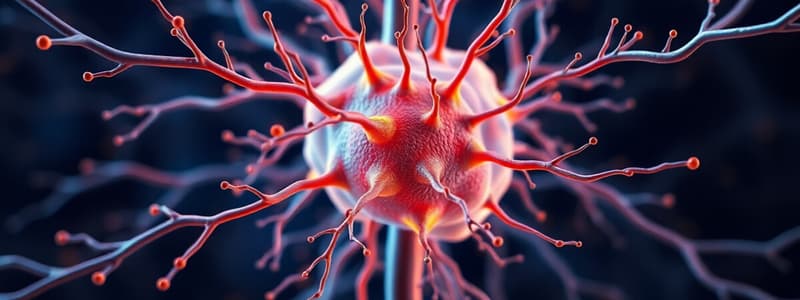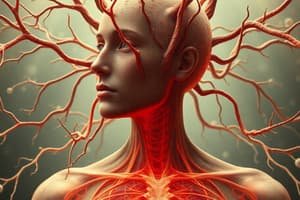Podcast
Questions and Answers
What process describes a decrease in response to a stimulus over time?
What process describes a decrease in response to a stimulus over time?
- Sensory adaptation (correct)
- Sensory perception
- Sensory modulation
- Sensory integration
Which type of receptor responds to chemicals in the environment?
Which type of receptor responds to chemicals in the environment?
- Mechanoreceptor
- Thermoreceptor
- Chemoreceptor (correct)
- Photoreceptor
What is the primary function of nociceptors?
What is the primary function of nociceptors?
- Detect smell
- Detect sound
- Detect pain (correct)
- Detect light
Which method can reduce pain by acting on prostaglandin synthesis?
Which method can reduce pain by acting on prostaglandin synthesis?
Which sensory organ is responsible for the sense of smell?
Which sensory organ is responsible for the sense of smell?
Which of the following is NOT a function of chemoreceptors?
Which of the following is NOT a function of chemoreceptors?
What percentage of what we perceive as taste is actually due to our sense of smell?
What percentage of what we perceive as taste is actually due to our sense of smell?
Hair cells in the semicircular canals of the inner ear are responsible for sensing what?
Hair cells in the semicircular canals of the inner ear are responsible for sensing what?
What is the primary function of sensory receptors?
What is the primary function of sensory receptors?
Which type of sensory receptor primarily detects external stimuli?
Which type of sensory receptor primarily detects external stimuli?
What process do sensory receptors use to transform stimuli into electrical signals?
What process do sensory receptors use to transform stimuli into electrical signals?
Which of the following is NOT an example of an exteroceptor?
Which of the following is NOT an example of an exteroceptor?
What type of sensory receptor responds to changes in blood pressure?
What type of sensory receptor responds to changes in blood pressure?
Which category of sensory receptors is responsible for detecting light?
Which category of sensory receptors is responsible for detecting light?
What role do stretch receptors play in the body?
What role do stretch receptors play in the body?
Which type of sensory receptor detects changes in temperature?
Which type of sensory receptor detects changes in temperature?
What role do olfactory cells play in the sense of smell?
What role do olfactory cells play in the sense of smell?
What is the function of the auditory canal?
What is the function of the auditory canal?
Which structure marks the boundary between the outer ear and the middle ear?
Which structure marks the boundary between the outer ear and the middle ear?
Which of the following correctly identifies the three bones of the ossicles?
Which of the following correctly identifies the three bones of the ossicles?
What is the significance of the olfactory cilia?
What is the significance of the olfactory cilia?
What structures are covered by membranes in the middle ear?
What structures are covered by membranes in the middle ear?
Which part of the ear is primarily responsible for the perception of sound?
Which part of the ear is primarily responsible for the perception of sound?
Which component of the outer ear is also known as the auricle?
Which component of the outer ear is also known as the auricle?
What structure is the first to vibrate in the auditory pathway after sound waves strike the tympanic membrane?
What structure is the first to vibrate in the auditory pathway after sound waves strike the tympanic membrane?
What is the role of the stirrup in the auditory process?
What is the role of the stirrup in the auditory process?
Which structure in the ear is responsible for passing pressure to the fluid within the cochlea?
Which structure in the ear is responsible for passing pressure to the fluid within the cochlea?
What determines the volume of sound that is perceived?
What determines the volume of sound that is perceived?
In which division of the ear are the hammer, anvil, and stirrup located?
In which division of the ear are the hammer, anvil, and stirrup located?
What initiates the chain of vibrations in the middle ear upon sound wave arrival?
What initiates the chain of vibrations in the middle ear upon sound wave arrival?
What is the primary function of the cochlea in the auditory process?
What is the primary function of the cochlea in the auditory process?
Which of the following correctly describes the order of the ossicles as sound travels from the tympanic membrane?
Which of the following correctly describes the order of the ossicles as sound travels from the tympanic membrane?
What happens to the oval window when the stirrup strikes it?
What happens to the oval window when the stirrup strikes it?
Which part of the ear is primarily involved in the conversion of mechanical vibrations into neural signals?
Which part of the ear is primarily involved in the conversion of mechanical vibrations into neural signals?
Which type of receptor is responsible for detecting changes in temperature?
Which type of receptor is responsible for detecting changes in temperature?
What is the primary function of chemoreceptors?
What is the primary function of chemoreceptors?
Where in the body are temperature-regulating thermoreceptors located?
Where in the body are temperature-regulating thermoreceptors located?
Which sensory receptor detects sound waves?
Which sensory receptor detects sound waves?
Which part of the brain is responsible for the conscious perception of stimuli?
Which part of the brain is responsible for the conscious perception of stimuli?
How do mechanoreceptors primarily function?
How do mechanoreceptors primarily function?
What kind of equilibrium do hair cells in the vestibule of the inner ear help monitor?
What kind of equilibrium do hair cells in the vestibule of the inner ear help monitor?
Which of the following senses is NOT associated with chemoreceptors?
Which of the following senses is NOT associated with chemoreceptors?
Flashcards are hidden until you start studying
Study Notes
Organization of the Nervous System
- The Nervous System is divided into the Peripheral Nervous System (PNS) and the Central Nervous System (CNS).
- The PNS connects the CNS to the rest of the body, while the CNS consists of the brain and spinal cord.
The Two Divisions of the Nervous System
- The Nervous System is divided into the Somatic Nervous System (SNS) and the Autonomic Nervous System (ANS).
- The SNS controls voluntary movements, while the ANS controls involuntary functions such as heart rate and digestion.
Overview of Sensory Receptors and Sensations
- Sensory receptors convert stimuli into nerve impulses.
- Exteroceptors detect stimuli from outside the body.
- Interoceptors detect stimuli from inside the body.
Types of Sensory Receptors
- Sensory receptors are classified into four categories: chemoreceptors, photoreceptors, mechanoreceptors, and thermoreceptors.
- Chemoreceptors respond to chemical substances.
- Photoreceptors respond to light.
- Mechanoreceptors are stimulated by mechanical forces.
- Thermoreceptors are stimulated by changes in temperature.
Exteroceptors
- Taste cells are chemoreceptors that detect chemicals in food and drink.
- Olfactory cells are chemoreceptors that detect odor molecules.
- Rod cells and cone cells are photoreceptors that detect light.
- Hair cells in the spiral organ of the inner ear are mechanoreceptors that detect sound waves.
- Hair cells in the semicircular canals of the inner ear are mechanoreceptors that detect rotational movement.
- Hair cells in the vestibule of the inner ear are mechanoreceptors that detect gravity.
How Sensation Occurs
- Sensation is the conscious perception of stimuli.
- The sensation that results depends on which part of the brain receives the nerve signals.
- Sensory adaptation is a decrease in response to a stimulus over time.
Pain Receptors
- Pain receptors are called nociceptors.
- Prostaglandins bind to nociceptors and cause pain.
- Aspirin and ibuprofen reduce pain by inhibiting the enzymes that synthesize prostaglandins.
Sense of Smell
- 80% of what we perceive as "taste" is actually due to the sense of smell.
- Olfactory cells are found in the olfactory epithelia in the roof of the nasal cavity.
- Each olfactory cell has olfactory cilia that bear receptor proteins for odor molecules.
Anatomy and Physiology of the Ear
- The ear is divided into the outer ear, middle ear, and inner ear.
- The outer ear consists of the pinna and the auditory canal.
- The middle ear starts at the tympanic membrane and ends at the oval window and round window.
- The middle ear contains three ossicles: the malleus, incus, and stapes.
- The inner ear contains the cochlea, semicircular canals, and vestibule.
Auditory Pathway to the Brain
- Sound waves strike the tympanic membrane, causing it to vibrate.
- The vibrations are transmitted to the malleus, incus, and stapes.
- The stapes strikes the oval window, causing it to vibrate.
- The vibrations of the oval window pass pressure to the fluid in the cochlea.
The Cochlea
- The cochlea is a spiral-shaped structure in the inner ear.
- The cochlea contains hair cells that are sensitive to different frequencies of sound waves.
- The volume of sound is determined by the amplitude of the sound waves.
Studying That Suits You
Use AI to generate personalized quizzes and flashcards to suit your learning preferences.




